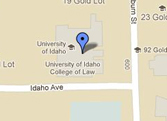College of Law
Moscow

uilaw@uidaho.edu
Administration Office: 208-885-2255
Dean’s Office: 208-885-4977
fax: 208-885-5709
Menard 101
711 S. Rayburn Drive
Mailing Address:
College of Law
University of Idaho
875 Perimeter Drive MS 2321
Moscow, ID 83844-2321
Boise
First Monday - July 7, 2008
In this issue:
- State Board Receives Update on Development of “Second Century” Plan
- College Announces New and Visiting Faculty for 2008-09
State Board Receives Update on Development of “Second Century” Plan
On June 19 in Idaho Falls, the University of Idaho Board of Regents (State Board of Education) received an update on the process for developing the College’s plan to implement the dual location concept as the University moves into a second century of legal education in 2009. The plan for delivering the J.D. degree at two locations, Moscow and Boise, is being developed pursuant to a vote of the State Board on April 17, “approv[ing] the request by the University of Idaho for authority to proceed with implementation planning for the two-location concept, including operating budget, capital budget, facility needs analysis, curriculum and an implementation timeline.” Providing the update for the Board in Idaho Falls were University President Timothy White, incoming Interim President Steven Daley-Laursen, Idaho Supreme Court Chief Justice Daniel Eismann, and Dean Donald Burnett.
Presidents White and Daley-Laursen each affirmed that the College’s “second century” initiative is a top University priority. Chief Justice Eismann explained the cost-effective synergy of the College’s initiative and the Supreme Court’s proposed “Idaho Law Learning Center” in Boise. The Learning Center will enable the Court and the College to collaborate in improving the Idaho State Law Library, making it the anchor of a distinctive educational environment for law students. The Center also will enhance court security, open up space in the Supreme Court Building for an expanded and relocated Court of Appeals, furnish a venue for judicial education and cooperative programs with other branches of government, and a create a unique location for programs of public outreach and civic education on the rule of law in a democratic society. The Chief Justice noted that participation by the College is essential to achieving all of these objectives, and that the Learning Center is the state judiciary’s highest capital funding priority. Studies now underway, funded by the 2008 Legislature, are focusing on the comparative merits of constructing a new building east of the Supreme Court or of renovating and expanding the Capitol Annex (old Ada County Courthouse) between the Supreme Court and the Statehouse. (The Capitol Annex could temporarily house the Learning Center even if the new building option were chosen.)
Dean Burnett stated that the College’s implementation plan will contain research on future demand for the J.D. degree along with detailed expense and revenue projections developed in concert with the College’s academic consultant, approved by the University, and reviewed by the State Board’s staff. Funding sources will consist of appropriations, student fees, and private giving, as well as grants and contracts. The plan will emphasize academic quality through a conservative, multi-year process of developing the Boise location until it eventually reaches a capacity of approximately 250 students (about 85 per class), consistent with the design of the Idaho Law Learning Center. The Moscow location will be sustained at approximately 250 students as well, consistent with the original design of the Menard Law Building in 1972. Core courses (typically sectioned at larger law schools) will be offered at each location, with a shared emphasis on professional values and ethics. Subject-area specialties will be differentiated in order to achieve excellence and avoid undue duplication. Moscow’s emphases, correlated with interdisciplinary connections on a land-grant campus, will include natural resources, environmental law, public lands, and federal-state-tribal relations. Boise’s emphases, correlated with the growing economy of a metropolitan area, will include business law, entrepreneurism, intellectual property, and international trade. The object of the dual location plan will be make the law school better (not merely bigger) by more fully serving all of Idaho – north and south -- while utilizing the advantages available at both locations, rather than at either location alone.
The implementation plan will be submitted to the State Board in July, for consideration by the Board during its meeting at Pocatello on August 21. Further information about the “second century” process may be obtained from Dean Burnett at dburnett@uidaho.edu.
College Announces New and Visiting Faculty for 2008-09
The College of Law is pleased to welcome new tenure-track professor Angelique A. EagleWoman, who has already begun work this summer. As noted previously in “First Monday,” Professor EagleWoman (native name Wambdi A. WasteWin) has been a visiting faculty member at the University of Kansas School of Law and Program on Indigenous Nations Studies, where she was chosen by graduate students to receive the 2008 Crystal Eagle Award bestowed upon “a scholar or community member who is making a significant difference or impact in the Indigenous communities at the local or national level." She previously was a member of the Hamline University (Minnesota) School of Law faculty, and she represented many tribes during her earlier years in the practice of law. Widely known and highly regarded in national Native American legal circles, Professor EagleWoman holds a baccalaureate degree from Stanford University, a J.D. degree from the University of North Dakota (where she was associate editor of the law review), and an LL.M. (post-J.D.) degree with honors in American Indian and Indigenous Law from the University of Tulsa. Her teaching will include Native American Law and related subjects, in addition to Civil Procedure.
The College also is pleased to announce visiting faculty members who will join our academic community during the 2008-09 academic year:
• Wendy G. Couture will serve as a visiting instructor, teaching Workplace Law, Remedies, Conflicts of Law, and White Collar Crime. She received her baccalaureate degree summa cum laude at Duke University and her J.D. degree, also summa cum laude, at the Dedman School of Law, Southern Methodist University, where she was the valedictorian, co-editor of the Texas law survey issue of the Law Review, and an inductee into the Order of the Coif. She has served as a law clerk for the United States District for the Northern District of Texas, practiced criminal law with a major firm in Dallas, and, most recently, practiced commercial law in Olympia, Washington.
• Nora O’Callaghan also will serve as a visiting instructor. Her teaching responsibilities will include Constitutional Law, Criminal Procedure, and Bioethics. She received her baccalaureate degree with honors (Phi Beta Kappa) at the University of Illinois and her J.D. degree magna cum laude from the Georgetown University Law Center, where she was a member of the Law Review and an inductee into the Order of the Coif. After clerking for the U.S. Court of Appeals for the Ninth Circuit, she practiced law with a major Chicago firm and as an in-house attorney and agency director for the Catholic Archdiocese of Chicago. A member of the Ave Maria School of Law (Michigan) faculty, she has taken a leave of absence for the opportunity to teach at the University of Idaho.
• Abigail A. Patthoff will join our Legal Research and Writing faculty on a renewable one-year appointment. She received her baccalaureate degree summa cum laude from West Virginia University, where she was named the Outstanding Senior English Major. She went on to earn her J.D. degree at WVU, where she ranked second in her class, served as Executive Notes Editor of the Law Review, and was inducted into the Order of the Coif. She comes to the University of Idaho from a clerkship at the United States District Court for the Northern District of West Virginia.
Further information about new faculty members and the faculty appointments process may be obtained from Professor Elizabeth Brandt, Associate Dean for Faculty Affairs, at ebrandt@uidaho.edu.

